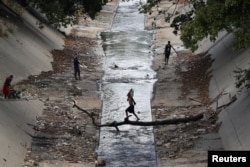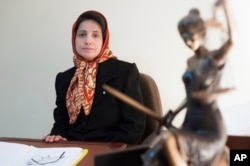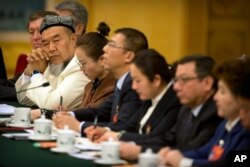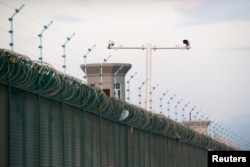The U.S. State Department is painting a grim picture of violations and abuses in countries that already have dismal records in its "Country Reports on Human Rights Practices for 2018."
Secretary of State Mike Pompeo on Wednesday highlighted abuses in Iran, South Sudan, Nicaragua and China in his remarks on the release of the report.
"I wish I could say that the record of every country evaluated in this year's report is spotless or even improved, but it's simply not the case," Pompeo said.
This year's report evaluates the practices of roughly 200 countries and territories.
Venezuela
In Latin America, the report cited extrajudicial killings, the stifling of free expression, and restrictions on political participation in Venezuela. It said the May 20, 2018, presidential vote that re-elected Nicolas Maduro was "deeply flawed" and was boycotted by the opposition and condemned by the international community.
The State Department report also pointed to issues including "pervasive corruption and impunity among all security forces" in Venezuela and in the Maduro government, "trafficking in persons and the worst forms of child labor, which the government made minimal efforts to eliminate."
"The situation on the ground is deteriorating. It's so tragic. The humanitarian conditions there are just awful. You have people starving, can't get medicine to the sick," Pompeo said in an interview in Houston.
"The human rights situation in Venezuela is terrible" and is only getting worse, said Ambassador Michael Kozak from the State Department's Bureau of Democracy, Human Rights, and Labor, adding the denial of U.S. medical and food aid by the Maduro government only exacerbates its humanitarian crisis.
Iran
On Iran, the report said, "The government's human rights record remained extremely poor and worsened in several key areas."
The high-profile case of Iranian attorney Nasrin Sotoudeh was featured in the report. Sotoudeh, who represents political prisoners and women that protested against the country's compulsory hijab law, was arrested on June 13, 2018, on national security charges.She was sentenced to 38 years in prison and 148 lashes on March 12, 2019.
"We are outraged," said State Department deputy spokesperson Robert Palladino in Tuesday's briefing. "This sentence is beyond barbaric."
The human rights report also pointed to issues including executions for crimes without fair trials, arbitrary killings and forced disappearance, harsh and life-threatening prison conditions, systematic use of arbitrary detention and imprisonment, unlawful interference with privacy, and severe restrictions on free expression, the press and the internet.
China
On China, the State Department's human rights report said the government significantly intensified its campaign of mass detention of members of Muslim minority groups in the Xinjiang Uighur Autonomous Region (Xinjiang).
Pompeo said China is "in a league of its own" when it comes to human rights violations.
"Today, more than 1 million Uighurs, ethnic Kazakhs and other Muslims are interned in reeducation camps designed to erase their religious and ethnic identities. The government also is increasing its persecution against Christians, Tibetans and anyone who espouses different views from those or advocates those of government — or advocates change in government," said the top U.S. diplomat.
Other issues include arbitrary detention by the Chinese government; physical attacks on and the criminal prosecution of journalists, lawyers, petitioners, and their family members; severe restrictions on religious freedom; the forcible return of asylum-seekers to North Korea, where they have a well-founded fear of persecution; and official repression of the freedom of speech, religion, movement, association and assembly in Tibet, according to the report.
China says it is running a deradicalization program and that the camps are vocational training centers to teach people about the law and the Mandarin language.Chinese authorities said Tuesday that the camps in Xinjiang will "gradually disappear" if a time arises when "society does not need them."
Samuel Brownback, the U.S. ambassador for religious freedom, said Friday during a speech in Hong Kong that China's detentions are not proportionate to any real threat it faces from extremism.
"China is not solving a terrorist problem by forcibly moving women, children, the elderly and the highly educated intelligentsia into mass detention centers and internment camps. Instead, they are creating one," he said.
U.S. lawmakers are pressuring the Trump administration to take stronger actions against China. The House Foreign Affairs Committee told Pompeo last week it "appears the administration has taken no meaningful action" on the matter.
Pompeo said the administration is considering sanctions against Chinese officials responsible for rights abuses against the Uighurs in Xinjiang.
Reproductive rights missing
Separately, critics on Wednesday pointed to the fact that the report does not highlight countries that commit human rights abuses around reproductive health.
"For the last 25 years, most of the world has recognized that empowering women to control their bodies helps them and their families to access other rights, but you wouldn't know that from today's report," said Sarah Margon, Washington director at Human Rights Watch.
"The State Department is essentially deciding that a significant set of women's rights are not human rights at all," she added.
It is the second time since 2012 the State Department's human rights report eliminated references to women's "reproductive rights" since 2012.









